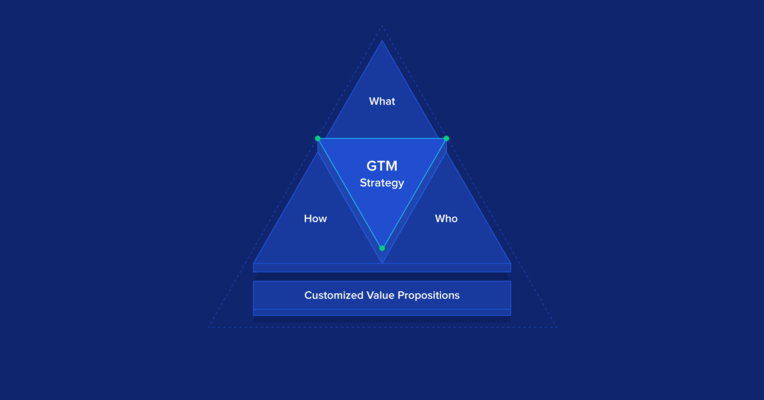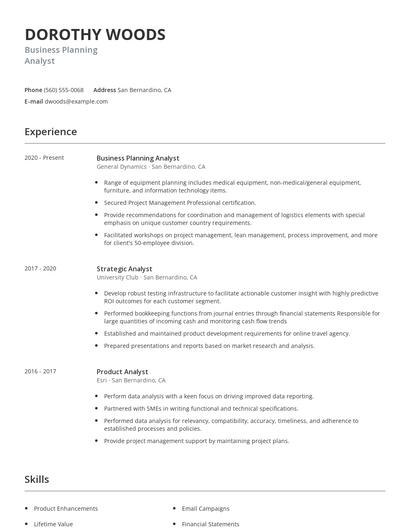

What Does a Business Planning Manager Do?
Find out what a Business Planning Manager does, how to get this job, salary information, and what it takes to succeed as a Business Planning Manager.

The Business Planning Manager plays a strategic role in steering the company’s direction through comprehensive market analysis, forecasting, and resource allocation. This position involves synthesizing complex data into actionable strategies that align with the company’s long-term goals and financial objectives. By closely monitoring industry trends and evaluating business performance, the Business Planning Manager ensures that the organization remains agile and responsive to changing market demands. Collaboration with various departments to develop and implement plans that enhance operational efficiency and profitability is also a significant aspect of the role. Through a balanced approach to risk management and opportunity identification, the Business Planning Manager supports the company in maintaining a competitive edge and achieving sustainable growth.
Business Planning Manager Job Duties
- Develop and implement comprehensive business plans to facilitate achievement by planning cost-effective operations and market development activities.
- Analyze and forecast financial, economic, and other data to provide accurate and timely information for strategic and operational decisions.
- Coordinate cross-functional teams to develop business strategies and objectives, ensuring alignment with corporate goals.
- Evaluate competitive market strategies through analysis of related product, market, or share trends.
- Identify and drive initiatives to improve operational efficiency, including process improvements, cost reduction, and systems enhancements.
- Facilitate communication and collaboration among departments to ensure that business planning and strategies are aligned with company-wide goals.
- Oversee the preparation of operational and risk reports for management analysis.
- Spearhead the development of new business opportunities, including expansion, mergers, acquisitions, and partnerships.
Business Planning Manager Salary & Outlook
Factors affecting a Business Planning Manager’s salary include industry sector, company size, years of experience, and specific skills in strategic planning, financial modeling, and market analysis. Performance outcomes and the ability to influence business growth also significantly impact compensation.
- Median Annual Salary: $110,250 ($53/hour)
- Top 10% Annual Salary: $152,000 ($73.08/hour)
The employment of business planning managers is expected to grow faster than average over the next decade.
This growth is driven by the increasing complexity of global markets, the need for strategic planning in competitive environments, and the demand for innovation in product and service development. Business Planning Managers are pivotal in navigating these challenges, making their role more critical than ever.
Business Planning Manager Job Requirements
Education: A Business Planning Manager typically holds a Bachelor’s Degree in Business Administration, Finance, or a related field. Coursework often includes strategic management, financial analysis, market research, and organizational behavior. Advanced degrees like an MBA can enhance prospects, focusing on leadership, advanced strategic planning, and international business. Specialized courses in data analysis, project management, and economics are also beneficial, equipping candidates with the necessary skills to excel in developing and implementing business strategies.
Experience: Business Planning Managers typically come from diverse experience backgrounds, with a significant portion having substantial experience in strategic planning, financial analysis, and project management. Many have progressed through roles that required increasing responsibility in business strategy and operations. On-the-job training is common, often through mentorship or rotational programs within a company, allowing for hands-on experience in different business units. Training programs focusing on leadership, data analysis, and market research are also valuable, equipping candidates with the skills to lead cross-functional teams and drive business growth. Successful candidates often demonstrate a blend of practical experience in business planning and strategic initiatives, coupled with formal training programs that enhance their analytical and leadership capabilities.
Certifications & Licenses: Certifications and licenses are not typically required for the role of Business Planning Manager.
Business Planning Manager Skills
Strategic Forecasting: Leveraging data-driven insights, a Business Planning Manager predicts market trends to develop strategies that align with organizational goals. This involves synthesizing diverse information sources to anticipate challenges and opportunities, keeping the company agile and competitive.
Market Analysis: Through the meticulous examination of trends, customer behaviors, and competitor activities, Business Planning Managers can forecast market demands and pinpoint opportunities or threats. This skill hinges on thorough data collection and interpretation to inform strategic decisions.
Financial Modeling: Business Planning Managers create detailed, predictive models of a company’s financial future to forecast revenue, assess risk, and efficiently allocate resources. This requires a solid grasp of accounting principles, spreadsheet software proficiency, and the ability to interpret market trends for data-driven strategic planning.
Risk Management: By identifying potential threats and developing strategies to mitigate them, Business Planning Managers protect the organization’s interests and ensure its long-term sustainability. Analyzing market trends, financial forecasts, and operational vulnerabilities is crucial for preemptively addressing challenges.
Stakeholder Engagement: Building and maintaining strong relationships with investors, partners, and internal teams is critical for aligning business strategies and meeting project milestones. This skill ensures smoother project execution and fosters an environment of trust and mutual respect.
Performance Optimization: Data-driven insights and lean methodologies are used to streamline operations, reduce waste, and boost business efficiency. Analyzing performance metrics, identifying bottlenecks, and implementing strategic interventions are key for sustained organizational improvement.
Business Planning Manager Work Environment
A Business Planning Manager typically operates within a structured office environment, where the workspace is designed to foster both concentration and collaboration. The setup usually includes personal computers, advanced planning software, and access to data analytics tools, essential for strategic decision-making and forecasting.
Work hours might extend beyond the traditional 9-to-5, especially during critical planning phases, though many organizations offer flexibility to accommodate work-life balance. The dress code tends to align with corporate standards, leaning towards business casual or formal, depending on the company’s culture and external meeting requirements.
The role demands frequent interaction with team members, stakeholders, and departments, necessitating strong communication channels and a cooperative atmosphere. Travel may be required for industry events or company-wide meetings, adding variety to the routine.
Professional development opportunities are often available, encouraging continuous learning and advancement in strategic planning methodologies and leadership skills. This role thrives in a setting that values analytical thinking, adaptability, and collaborative problem-solving.
Advancement Prospects
A Business Planning Manager can ascend to higher strategic roles within an organization, such as Director of Strategy or Chief Operations Officer (COO), by demonstrating exceptional analytical, leadership, and decision-making skills. Success in this career path hinges on the ability to drive business growth and efficiency through innovative planning and execution.
To achieve these advancements, a Business Planning Manager should focus on spearheading high-impact projects and initiatives that align with the company’s long-term goals. Gaining experience in cross-functional team leadership and developing a deep understanding of the industry’s competitive landscape are crucial.
Building a track record of successful business plans and strategies that have significantly contributed to the company’s profitability and market position will set a solid foundation for moving into top executive roles. Engaging in high-level decision-making processes and demonstrating a keen insight into market trends and business opportunities are essential steps toward career progression in this field.
What Does a Rental Car Manager Do?
What does a radiology coordinator do, you may also be interested in..., what does a medical accountant do, what does a us postal service cca do, what does a loader operator do, what does a volleyball coach do.

Strategy Job Descriptions
Business planning analyst job description, business planning analyst.
As a Business Planning Analyst at [Company Name], you will play a crucial role in driving the company's growth and success. You will be part of the [Team], reporting to the [Reporting To]. In this role, you will work closely with the [Teams Collaboration] to support and strengthen the company's business planning and strategy.
Responsibilities:
- Conduct market research and analysis to identify new business opportunities.
- Assist in the development and implementation of business plans and strategies.
- Analyze financial data and create reports to support decision-making processes.
- Collaborate with cross-functional teams to assess and optimize business processes.
- Monitor and track key performance indicators to evaluate the effectiveness of business initiatives.
- Prepare presentations and reports for senior management and stakeholders.
- Support the development and execution of budgeting and forecasting activities.
- Stay updated on industry trends and competitive landscape to provide insights and recommendations.
Requirements:
- Bachelor's degree in business, finance, or a related field.
- [X years of experience] years of experience in business planning, strategic analysis, or a similar role.
- Strong analytical and problem-solving skills.
- Proficiency in data analysis and financial modeling.
- Excellent communication and presentation skills.
- Ability to work in a fast-paced and dynamic environment.
- Advanced knowledge of Microsoft Excel and PowerPoint.
- Experience with business intelligence tools and ERP systems is a plus.
Success Metrics:
- Timely completion of business plans and strategies.
- Accuracy and quality of financial analysis and reports.
- Contribution to improved business processes and efficiency.
- Positive feedback from senior management and stakeholders.
Your role as a Business Planning Analyst at [Company Name] will be instrumental in driving the company's growth, development, and achievement of strategic objectives. By providing valuable insights and supporting the implementation of effective business plans and strategies, you will contribute to the overall success of the organization.
Add [Contact Name] at [Email] to apply.
Generate free personalized PDF
Find your next business planning analyst.
Use our free tailored job description for the role of Business Planning Analyst. Our job description provides detailed responsibilities, requirements, success metrics, and more. It can be customized to meet the specific needs of your organization. Take the guesswork out of hiring and ensure you find the perfect candidate for the job.
About the Business Planning Analyst
A Business Planning Analyst plays a crucial role in the organization's strategic planning and execution. They are responsible for analyzing market trends, financial data, and business performance to develop actionable plans and recommendations. They collaborate with cross-functional teams to identify opportunities for growth, improve operational efficiency, and drive overall business success.
FAQs about the Business Planning Analyst
What is the role of the business planning analyst about.
The role of the Business Planning Analyst is to support the organization's strategic planning and execution efforts. They gather and analyze data, develop insights, and provide strategic recommendations to drive business growth. Our tailored job description provides a detailed overview of the responsibilities, requirements, and success metrics for this role. Examples of tasks may include conducting market research, creating financial models, and assisting with budget planning.
Why do you need a Business Planning Analyst?
A Business Planning Analyst is essential for effective strategy execution. They help organizations make informed decisions, identify growth opportunities, and align resources to achieve strategic goals. This supporting strategy execution role depends on the specific needs and structure of the organization. However, having a skilled Business Planning Analyst can significantly enhance the organization's ability to drive success and navigate complex business challenges.
What would be an average salary for the Business Planning Analyst?
The average salary for a Business Planning Analyst in the US ranges from $60,000 to $90,000 per year, depending on factors such as experience, location, and company size. This estimate is based on data from reputable sources like Glassdoor and can vary depending on the specific circumstances of each position.
Ready to find your next Business Planning Analyst? Create your tailored job description.
Articles to get your started with business planning analyst, the best strategy template for business planning analysts, your toolkit for strategy success.

Business Plan Consultant Job Description Template
A business plan consultant provides a financial, marketing, and operational roadmap to align stakeholders and help your business achieve its goals.
Trusted by leading brands and startups
Watch the case study
Business plans are the North Star for early-stage businesses, used as a reference point when making major business decisions, collateral when securing a new fundraising round, and as an introduction to the business and its goals when recruiting new key hires.
While business plan templates can be found online, these ready-made guides can drive entrepreneurs and their businesses away from what they actually need to achieve. A top business plan consultant will construct a custom plan that takes into account the specifics of your business, or review and pressure-test an existing plan while taking into account the latest industry trends.
Business Plan Consultant - Job Description and Ad Template
Copy this template, and modify it as your own:
Company Introduction
{{Write a short and catchy paragraph about your company. Provide information about the company’s culture, perks, and benefits. Mention office hours, remote working possibilities, and anything else that makes your company interesting.}}
Job Description
A business plan consultant provides strategic direction by {{creating or methodically pressure-testing and refining}} a company’s business plan, using an understanding of the company’s core operations, competitive advantages, and goals to provide direction on how to structure, run, and grow the business.
The ideal candidate will have some experience in running or advising early stage businesses, combining the analytical abilities of a CFA charterholder with the broad vision of a CEO to provide a roadmap to growth.
Responsibilities
- Develop an understanding of the existing business (including products/services, customers, competitors, the overall market and trends) through careful research and analysis
- Understand how major stakeholders are thinking about near-term growth, generally and in reference to specific growth initiatives, through interviews with these stakeholders
- Build a detailed financial analysis showing all of the assumptions, drivers, and financial statements for the next 3 - 5 years, accounting for a conservative, base, and aggressive case
- Conduct a total addressable market analysis for the business’ core market, assess major industry trends affecting the business, and describe what impact these trends may have on the business
- Review research reports and conduct primary research to hone in on ideal buyer type and assess customer demand for the company’s existing products and services
- Map out direct and indirect competitors, including potential future competitors, for existing and potential revenue channels
- Define a go-to-market strategy, including testing out potential marketing channels (if applicable)
- Review compensation plans and organizational structure to align incentives and ensure the health of the organization in the long-run
Skills and Qualifications
- Bachelor’s degree in finance, operations, research, statistics, math, economics, or related analytical discipline preferred
- Financial management experience with planning, forecasting, and business analysis; prior experience as an advisor to or executive at an early-stage company a plus
- Advanced Excel proficiency. 3+ years of practical experience of using Excel for building and maintaining financial models
- Proficiency with analytical and presentation tools {{(Excel pivot tables, SQL queries, graphing, PowerPoint)}}
- Experience within {{preferred industry}}
- A natural curiosity and a “big picture” mentality
- Experience conducting market research, including analyzing and synthesizing research reports and conducting primary research
- An understanding of marketing channels and go-to-market strategies
- Excellent spoken and written communication; comfort reaching out to and interviewing the company’s management, employees, and customer base
Recent Business Plan Articles by Toptal Finance Experts

5 Key Tips for Smarter Sales and Operations Planning Implementation

Creating a Narrative from Numbers

Small Business Resources for COVID-19: Loans, Grants, and Credits

How to Craft a Successful Go-to-Market Strategy

The Undeniable Importance of a Business Plan

Business Plan Consultants: Who They Are and How They Create Value
How to hire business plan consultants.
Business plan consultants have the industry knowledge and expertise to develop a business plan that maximizes your company’s potential and attracts investors. This guide to hiring business plan experts offers insight into best practices, skill requirements, job description tips, and interview questions and answers to help you identify the best candidate for your needs.
Hire a Top Business Plan Consultant Now
Toptal is a marketplace for top business plan consultants and experts. Top companies and startups hire freelance business plan consultants from Toptal for their mission critical projects.

Aleksey N. Krylov, CFA
Aleksey served in CFO roles of public and VC-backed private companies. As an investor, he contributed to 25+ private equity deals that have deployed $500 million. He has advised 50+ clients on raising $1.6 billion in equity in the healthcare, consumer, media, software, energy, and industrial sectors. Aleksey enjoys working with officers of early-stage and mature small-cap firms, and he freelances because it exposes him to a wide range of companies.

Josh Chapman
Josh is an investment banker turned VC who lives in Denver, CO. At Morgan Stanley, he covered the world's top hedge funds and sold over $5 billion in IPOs for companies like Alibaba, LendingClub, GrubHub, and more. He also has experience in M&A, startup fundraising, and as a founder. Currently, Josh is one of the managing partners of Konvoy Ventures, a VC firm focused on esports and video gaming.

Gary Calnan
Gary is a serial entrepreneur with CEO and CFO experience. Before co-founding an aerospace startup in 2017, Gary was the director of finance at a $120 million revenue SaaS company, where he was responsible for the financial management of multiple departments and supported three mergers. Gary leverages his unique blend of finance and entrepreneurial experience across early and growth-stage businesses to add value to Toptal clients.

Marc Howland
Marc is a Harvard Business School graduate with honors, a former investment banker from Goldman Sachs, and private equity investor at The Carlyle Group. He has helped execute more than $70 billion worth of global M&A and financing transactions in the tech, media, telecom, infrastructure and sports facility finance markets. Marc enjoys freelancing to contribute his knowledge and skills to others while working on his own early-stage ventures.

Travis Borden
Travis was part of the founding team at Moelis & Co., a $2.5 billion global investment bank, and has 18 years of experience advising clients on $40+ billion of M&A, capital raising, and restructuring transactions. In 2015, he founded a socially responsible advisory firm, Keene Advisors, named "Best for the World" 2017-2019. Travis joined Toptal to expand his network and share his expertise advising companies from startups to Fortune 500 firms.

Andy Vietor
Andy was recognized twice as an All-Star Analyst by the Wall Street Journal. He has been a strategist, operating executive, financier, and top-ranked industry analyst. As a freelancer, Andy advises a range of companies—from early-stage and middle-market to large caps—delivering customized solutions including effective investor presentations, dynamic financial models, and project finance structuring.

Bertrand Deleuse
Bertrand is a 25-year finance veteran with a true 360 experience, honed as an investment banker, venture advisor, project developer, CFO, and expert witness consultant in international arbitrations. He has advised and partnered on over 100 transactions and investment initiatives totaling over $16 billion. Bertrand is a seasoned problem solver and decision-maker with expert facilitation skills. Bertrand advises on M&A, corporate development, venture growth, project development, and financing.

Olivia Passoni
Olivia has over a decade of advisory experience, specializing in valuation, financial and business planning, M&A, capital raising, and due diligence. She has advised business owners globally on financial planning and strategy optimization during the fundraising and exit process. Olivia also works with investors for portfolio valuation work, the development of fund models, and due diligence. She is a Certified Valuation Analyst and is specialized in early-stage valuations.

Andrew Grigolyunovich, CFA, CFM
Andrew ranked fifth at the 2017 Financial Modeling World Championships. He served as CFO for Latvia’s leading retailer for seven years, navigating the firm through the global financial crisis and executing a turnaround that led to profitability and international expansion. He went on to freelance consulting, growing his client base to 250+ in 17 countries. Andrew joined Toptal to work with clients on FP&A, financial modeling, and M&A.
Sign up now to see more profiles.
Toptal Connects the Top 3% of Freelance Talent All Over The World.
Join the Toptal community.
ZenBusinessPlans
Home » Business Plans
How to Write a Job Description for a Business Plan [Sample Template]
Are you in the process of writing the job description section of your business plan? Or you need a sample job description template? Then I advice you read on. Here, you drive home the point that not only do you know what you are doing or where you are going, but that you have the right mix of talent and experience to actually make it all happen.
You will need to highlight key members of your management team ( which may be only you for the time being ) as well as external service providers such as lawyers, accountants, and contract professionals. Also, include your advisors or board members ( if you have any ) as well as the positions you will be looking to hire in the near future.
While planning your business, one of the most important steps that you shouldn’t skip is writing a job description for every position that you are planning to hire an employee for. This may not be important if you have no plans to hire employees.
A job description is an important tool for hiring and managing your employees, as it helps them understand their roles and responsibilities even before they start working with you. It tells them what they need to do, how they need to do it, and what they will be held accountable for as soon as they assume their duties. It also reveal to investors who-is-who in your proposed or established business. In addition, a job description does the following:
4 Benefits of a Job Description in a Business Plan
- It helps you attract the right employees
- It gives a detailed description of an employee’s job or position
- It serves as a basis for outlining performance expectations, career advancement, job training, and job evaluation
- It provides a reference point for compensation decisions as well as unfair hiring practices
Writing a Job Description for a Business Plan – Sample Template
A job description should be clearly written, accurate, and very practical. It must effectively define your needs as well as what you expect from your employees. To write a good job description, you should start by analyzing the important facts about a job, such as:
The individual tasks involved
What are the tasks that the employee must complete on a periodic basis? Outline daily tasks, weekly tasks, monthly tasks, and quarterly tasks required of the employee. To be practical enough, outline the duration and requirements of each task as well.
The methods for completing each task
If the tasks outlined can be handled using more than one method, outline which methods you can afford to provide your employee (but for optimal employee efficiency, make provisions for the best method available).
The purpose and responsibilities of the job
Outline how the role played by the chosen candidate would contribute to the business. Also, outline what the employee would be held accountable for.
The relationship of the job to other jobs
Outline how the chosen employee would work with other employees within the company.
Qualifications needed for the job
Outline the relevant qualifications that each candidate must have. Also state the number of years for which the candidate must have gained working experience in the same position.
The Outline of a Job Description
A job description typically includes the following:
- Job objective or overall purpose statement
- Brief of the general nature and level of the job
- Detailed description of the wide scope of the position
- List of duties or tasks to be performed that are critical to success
- Key functional and relational responsibilities (listed in order of significance)
- Description of the relationships and roles within the company, including the supervisory roles, subordinating roles, and other working relationships
In addition to the above listed, the following items may be added to the job description if deemed necessary:
- Job requirements, standards, and specifications
- Job location where the work will be performed
- Equipments available to be used for the job
- Salary range
5 Tips to Note When Writing a Job Description
- Always use verbs in the present tense.
- For the purpose of clarity and adding meaning, use explanatory sentences telling why, how, where, or how often whenever necessary.
- Delete any unnecessary articles such as “ a ”, “ an ”, “ the ” or other stop words to make the description easy to read and understand.
- Be unbiased in your use of pronouns. Use the “ he/she ” approach or construct your sentences in such a way that you won’t have to use pronouns.
- Avoid the use of adverbs or adjectives that are subject to additional explanation and interpretation; such as some, complex, several, occasional, frequently, etc. Rather than use them, use clear sentences that define your intent.
What to Avoid When Writing a Job Description
Don’t be rigid with your job description, as this may make you miss out on many diligent employees who can become great assets to your business. Jobs are subject to change for personal improvement, organizational development, and evolution of new technologies. A flexible job description encourages employees to grow within their position and contribute over time to the growth and development of your business.
In conclusion , a well-written job description can make all the difference between a successful business that grows over the years and one that remains on the same spot after several years. The right employees, if chosen for your business, can help propel your business to great heights within a short period. Only with a good job description can you hire such.
- Go to Chapter 8 Part E: Planning your Business Legal Structure
More on Business Plans
404 Not found
Lorem ipsum dolor sit amet, consectetur adipiscing elit. Vivamus convallis sem tellus, vitae egestas felis vestibule ut.
Error message details.
Reuse Permissions
Request permission to republish or redistribute SHRM content and materials.
Manager of Strategic Planning
Job summary:.
The Manager of Strategic Planning will develop and direct the strategic and long-range goals of the organization including proposals to enter new markets and to expand existing market presence.
Supervisory Responsibilities:
- Recruits, interviews, hires, and trains new staff in the department.
- Oversees the daily workflow of the department.
- Provides constructive and timely performance evaluations.
Duties/Responsibilities:
- Collaborates with executives and managers to develop long-range, strategic goals for the organization.
- Identifies and reviews pricing and market trends; analyzes and applies this information in development of strategies for individual market segments.
- Monitors business climate, trends in technology and development, and government activity in areas of the companys current and anticipated product lines.
- Leads trials concerning new business initiatives, pilot programs, and regional rollouts; based on results, makes, recommends, and implements adjustments and modifications.
- Collaborates with business unit administration and line managers to produce business and product plans that are profitable; evaluates these plans on a periodic basis.
- Serves as negotiator with third parties for potential mergers or product acquisitions.
- Performs other related duties as assigned.
Required Skills/Abilities:
- Excellent verbal and written communication skills.
- Thorough understanding of business administration, management, and business forecasting strategies and techniques.
- Excellent interpersonal and negotiation skills.
- Excellent organizational skills and attention to detail.
- Strong analytical and problem-solving skills.
- Strong supervisory and leadership skills.
- Proficient with Microsoft Office Suite or related software.
Education and Experience:
- Bachelors degree in Business, Marketing, or industry-related field required; MBA highly preferred.
- At least five years of experience in the industry or acting as a consultant on major strategic planning projects required.
Physical Requirements:
- Prolonged periods of sitting at a desk and working on a computer.
- Must be able to lift 15 pounds at times.
Related Content

Rising Demand for Workforce AI Skills Leads to Calls for Upskilling
As artificial intelligence technology continues to develop, the demand for workers with the ability to work alongside and manage AI systems will increase. This means that workers who are not able to adapt and learn these new skills will be left behind in the job market.

Employers Want New Grads with AI Experience, Knowledge
A vast majority of U.S. professionals say students entering the workforce should have experience using AI and be prepared to use it in the workplace, and they expect higher education to play a critical role in that preparation.
Advertisement

Artificial Intelligence in the Workplace
An organization run by AI is not a futuristic concept. Such technology is already a part of many workplaces and will continue to shape the labor market and HR. Here's how employers and employees can successfully manage generative AI and other AI-powered systems.
HR Daily Newsletter
New, trends and analysis, as well as breaking news alerts, to help HR professionals do their jobs better each business day.
Success title
Success caption
- Line of Credit
- How It Works
- Small Business Resources
- Small Business Blog
- Business Stories
- Our Platform
- Lender and Partner Resources
- Our Company
- 12 Responsibilities of a Small Business Owner
- Learning Center
- Business Owners
R unning a business comes with exciting opportunity, flexibility, and independence, but it’s also a major role to take on. Depending on your unique business situation, you’re probably doing much more than overseeing operations. Even when you’re involved in all the different everyday tasks, it’s important to remember your core responsibilities.

Why is it important to know the responsibilities of a small business owner?
Being a small business owner means wearing many hats and juggling many responsibilities each day. Understanding your responsibilities helps you stay organized and on the track to growth. Here’s why it’s important to know your responsibilities:
- Increased efficiency. Knowing that your responsibilities include the hiring and training process and overseeing your current employees means you’ll never neglect one group at the other’s expense. As a result, everyone will have all the resources they need to complete their work. With full resource access, your employees will get their work done more quickly, and your company will be more efficient.
- Less time wasted. When you sit atop the chain of command, your actions (or inaction) often affect your work environment and output. For example, if your development team can’t offer new goods or services without you approving the budget, your company loses precious time if you neglect your financial responsibilities. This possibility is far less likely if you know all your responsibilities.
- More knowledge. If you’re aware that business owners oversee customer service, marketing, finances, and all kinds of other tasks, you build knowledge in all kinds of areas. This means you have a stronger foundation to pull from when drafting a business plan for any new initiatives. It also means knowing what will and won’t work when executing your social media marketing strategy . For small business owners, knowledge is power.
12 responsibilities of a small business owner
Among the (many) responsibilities of a small business owner are the following:
1. Creating a business plan and strategy
As the owner of the small business, you decide the direction you’re heading and how you’ll get there. Setting benchmarks based on your long-term vision can help you understand what you need to achieve your dreams, whether that be time, resources, strategies, or a helping hand. If you do have a team supporting you, they’ll be empowered in their work when you’re transparent about your plan of action.
It can take a brainstorming session or two, or five, to narrow down what your most meaningful goals are and how they translate into actionable steps. Don’t hesitate to set aside time for high-level planning sessions where you measure progress, gather insights, and readjust the game plan if necessary.
2. Keeping track of finances and accounting
Most small businesses ( 81%, to be exact ) apply for a business loan or an SBA loan at some point. Depending on your needs and financial history, you’ll probably have to weigh your options when it comes to outside financing. Unless you’ve hired an accountant or bookkeeper, you’re also responsible for establishing and maintaining business bank accounts, payment processing systems, taxes, and day-to-day costs.
Not sure how you can apply the funds from a small business loan? Read our in-depth guide on the SmartBiz Resource Center: Determining Use of Proceeds .
3. Handling legal and compliance responsibilities
Running the ship comes with a new level of freedom, but it also means complying with rules and regulations. From the very beginning when you’re forming a business structure to the daily routines like drafting contracts and agreements, you should have at least some knowledge of the laws specific to your industry, location, and business type. When you need professional advice, it might be worth working with an attorney.
4. Managing marketing and sales
Even with a standout product or service, you’ll need to establish solid marketing strategies to bring customers through the door and drive your sales up. With so many available options out there, it’s up to you to decide the approach that fits best with your business goals. Some opportunities include social media, print advertising, PR, and event marketing.
5. Ensuring outstanding customer service
Next, once you’ve built a customer base, consider keeping them engaged throughout the sales process. Forming a relationship with the individuals who use your product or service is key to keep them coming back and even referring more customers. Whether you have a sales team or you’re wearing all the hats, there are plenty of tools out there that can help you manage and automate your processes. Looking into Customer Relationship Management (CRM) platforms is a great place to start. For inspiring customer service stories, check out this post: 6 Best Examples of Customer Service .

6. Identifying hiring and HR needs
As your small business grows, you might find that it’s time to hire help. Before you take the plunge and start placing ads, consider how much you’re willing to offer for potential candidates. Just like any other venture, this decision is probably a major turning point for your business so don’t underestimate the impact that hiring can have. Some of your responsibilities as the owner include identifying your company’s needs, crafting job descriptions, interviewing candidates, and making key hiring decisions.
7. Overseeing the team
The work doesn’t stop there—once you’ve hired the employees you think are a good fit, it’s your job to train, manage, and lead by example. When questions or concerns arise, you should be there for your team. Be sure to comply with local hiring laws to avoid any missteps that can result in big consequences. Visit the U.S. Department of Labor to learn what it takes to hire employees in your area.
8. Managing day-to-day operations
As a small business owner, you need to identify and manage all processes that keep your customers happy and support healthy growth, from manufacturing products to signing off on invoices. Although you don’t necessarily need to be hands-on in every process, you do need to make sure your team completes every step in a timely, thorough manner. Without this management, your products or services might not reach your standards.

9. Planning new initiatives
If your day-to-day operations aren’t getting you where you want to be, maybe it’s time to branch out. The responsibility for planning this expansion falls on you, though you can seek help from your employees or business partners. Market research will come in handy here, as will identifying other companies with which you can partner. So too will drafting a business plan for your new initiatives. Learn more via the SmartBiz Loans blog Ultimate Guide on How to Start A Business Plan .
10. Training your team
Employee training doesn’t stop after the initial onboarding process. Continued training is highly recommended, as it can minimize employee mistakes and prepare your team for any new paths your company might take. However, even if you task certain employees with executing your training program, it remains your responsibility to ensure everyone is receiving adequate instructions. After all, it’s your business – you wouldn’t want anyone working for you without being fully prepared.
11. Addressing technology issues
Small business owners like yourself should know the ins and outs of all the technology their company uses. This way, both new and longtime employees can go to you for quick, thorough answers. The result is a more efficient team that doesn’t fall behind when technological obstacles arise.
12. Staffing and management
As the owner of your company, you’re the final step for all human resources, customer service, and employee management concerns. Depending on the type of company you own, you may have sole discretion over these concerns. Alternatively, if you’re small enough that you’ve outsourced your HR to a third party, this entity may handle it. However, if you’re unhappy with how things are handled, you still get the final say.
Small business resources
As you see continued business success, you’ll probably identify key areas where you can grow. A boost in cash flow means that you can expand your programs and build your operations. Interested in receiving personalized recommendations and tips that can help you take your business to the next level?
Get started with SmartBiz Advisor today. Our free, AI-powered tool will be your Intelligent CFO, providing you with the insights and resources you need to strengthen your lending profile and qualify for the funding you deserve.

Have 5 minutes? Apply online

- Follow SmartBiz
Access to the right loan for right now

- Business Credit
- Business Finances
- Business Marketing
- Business Technologies
- Emergency Resources
- Employee Management
- Small Business Loans
- SmartBiz University
- More SBA Articles
Related Posts
Smartbiz helps facilitate access to financing for underrepresented entrepreneurs, women-owned business certification: learn about how to get yours, bank term loans 101: understanding the basics for small business, smart growth is smart business.
See if you pre-qualify, without impacting your credit score. 1
*We conduct a soft credit pull that will not affect your credit score. However, in processing your loan application, the lenders with whom we work will request your full credit report from one or more consumer reporting agencies, which is considered a hard credit pull and happens after your application is in the funding process and matched with a lender who is likely to fund your loan.
The SmartBiz® Small Business Blog and other related communications from SmartBiz Loans® are intended to provide general information on relevant topics for managing small businesses. Be aware that this is not a comprehensive analysis of the subject matter covered and is not intended to provide specific recommendations to you or your business with respect to the matters addressed. Please consult legal and financial processionals for further information.
Project team roles and responsibilities (with examples)
21 Mar 2023 By Jo Johansson

In this article 📖
Your project outcome is only going to be as good as the team behind it. There are no two ways about it—your project’s success depends on the skills, expertise, and experience of the project team you assemble.
That starts with an understanding of project team roles and responsibilities.
And that’s exactly what we’re here to do today.
What is a project team?
A project team is a group of individuals brought together to work on a specific project or initiative. The team will include roles needed for project planning, development, and implementation.
The team members collaborate to achieve a set of predetermined goals as stated in the project scope . This could be the launch of a product or service, or delivering a new design or feature for a client.
Each member of the team has a unique set of skills and responsibilities that contribute to the success of the project —ultimately, completing the project on schedule and on budget.
Establishing a project team helps you ensure important projects have a dedicated group made up of various skills and experiences so the work can be completed as efficiently as possible.
Team roles can be assigned to full-time or part-time employees, contractors, subject matter experts, or other external stakeholders.
Roles and responsibilities definition
Roles and responsibilities are related concepts. This article will cover the roles of a project team (what specific positions and functions make up a project team), as well as the responsibilities (the duties and tasks tied to each specific role).
5 key project team roles and responsibilities
Every project has different requirements, so team structure can vary. But the five major roles in a project team are project sponsor, project manager, business analyst, resource manager, and project team member.
Let’s dive into the roles and responsibilities of each, and how they work together.
1. Project sponsor: The person driving the vision
The sponsor is the in-house champion of a project, overseeing operations from a high level. This person works directly with the project manager, clearing any obstacles that threaten to stall the project and signing off on all major components.
A member of senior management typically fills this role. A project sponsor’s responsibilities include the following:
- Creating the project vision
- Earning buy-in from executive leadership
- Making critical decisions
- Approving the project budget
2. Project manager (or leader): The person managing day-to-day operations
Project managers or leaders are responsible for day-to-day operations and ensuring the project is completed on time, on budget, and achieves its objectives.
On a small project, the manager might oversee each team member. On a larger-scale project, they are more likely to oversee team leaders, who each manage their own group.
The project manager is responsible for the following:
- Creating the project plan and schedule
- Recruiting project staff
- Managing the budget
- Managing the project schedule
- Delegating project tasks to team members
- Managing all project deliverables
- Communicating with upper management and other stakeholders
3. Resource manager: In charge of resource allocation and utilization
The resource manager is critical when putting together your project team. Now, if your project isn’t big enough to require a resource manager, you’ll simply have to act as one. So what does that mean exactly?
- Identify the right people for a project
- Match project team roles and skills with project needs
- Allocate and schedule the right resource within the project timeline and budget
- Stay on top of resource availability and utilization
- Monitor and optimize the use of resources throughout the course of the project to make sure it can be completed successfully
4. Business analyst: Makes sure you have the data you need
The business analyst is responsible for gathering and analyzing data related to the project. They help identify the project’s requirements and determine the best approach to achieve the project’s objectives. They work with stakeholders to ensure that the project’s deliverables meet the organization’s needs.
The business analyst ensures the project team has the technology and tools to do their jobs effectively. They might also recommend new tools for streamlining workflows and improving quality, such as resource scheduling software .
A business analyst:
- Helps define the project and its goals
- Gathers technical requirements from team members
- Documents and analyzes project requirements
- Helps project team solve equipment management problems
- Tests solutions to ensure their effectiveness
5. Project team member (or project delivery team): Individual contributors assigned to different project tasks
Project delivery team responsibilities vary between projects and roles (which may include anything from developers and engineers, to designers and copywriters).
At a high level, all project team members are assigned the tasks required to complete the project, and are responsible for:
- Contributing to the project goals and objectives
- Completing individual tasks within the expected time frame
- Collaborating with other team members
- Communicating with the project manager about roadblocks
Other roles in a project team
Some larger projects require additional project management roles and responsibilities to support the core project team. These may include:
- An executive sponsor is a senior owner of the project (with more authority than the project sponsor) and the ultimate decision-maker
- A project owner is usually the person who proposed the project. They assist the project manager in ensuring successful implementation
- A project lead is someone who carries out a lot of the tasks of the project manager but doesn’t have as much experience or official qualifications
- A team leader is responsible for training team members and monitoring progress toward project objectives
- A functional manager’s responsibility can vary, but the primary function is to ensure the project team has the resources it needs, and address problems that slow down the project
- A program manager coordinates all projects related to a specific program and provides guidance to the project manager
- A subject matter expert (SME) has advanced knowledge of a specific area, practice, or process. They provide guidance and strategy to the project team
- A project coordinator or project management office (PMO) offers administrative support to the project team and establishes standards to ensure the team’s processes align with broader organizational goals
- Project stakeholders are people (internal or external to the project) who have an interest in and influence over the project. Their responsibilities and interests vary between (and even within) projects
- A steering committee includes senior-level stakeholders (such as the project sponsor) and company managers, and provides strategic support to help define business needs and achieve project outcomes
Project team roles and responsibilities example
Roles in a team project can get confusing (fast). So to demonstrate how project team roles work together, let’s use the example of an in-house marketing team undertaking a website redesign.
Project sponsor: This is the person who “owns” the project. In this case, the Chief Marketing Officer (CMO) might decide the website needed an overhaul as part of a big rebranding initiative. For this project, the responsibilities of the project sponsor could look something like the following:
- Ensures the redesign aligns with strategic business goals
- Assigns with the project manager
- Provides resources and support for the redesign
- Serves as an escalation point when problems arise
Project manager: This person oversees the execution of the project and manages the team. In this case, let’s say it’s the creative director. The project manager:
- Communicates with the sponsor and project team
- Sets milestones and deadlines
- Ensures the redesign stays on schedule and on budget
- Monitors the progress of the project
Resource manager: As the name implies, this person ensures the team has everything it needs to complete the redesign. In this case, let’s say it’s the chief information officer.
- Identifies the best project team roles based on the project scope
- Plans and allocates people and resources ( meeting rooms , equipment , etc.)
- Monitors utilization throughout the project and tracks billable hours
Project team members: These are the folks responsible for executing the redesign. They report to the project manager. The following roles need to be assigned:
- Front-end and back-end engineers
- QA engineer
- UX/UI designer
- Visual designer
Project team role and responsibilities matrix
Because roles and responsibilities can vary between projects, it can be helpful to create a RACI project team matrix at the very beginning of the project to clarify the expectations of each position.
RACI stands for responsible, accountable, consulted, and informed. It helps define the roles within a project management team and then identifies who needs to be looped in or assigned to each task.
It’s simple really, if everyone knows their roles within a project team , your project is much more likely to run smoothly.
The project team roles and responsibilities table below shows an example RACI matrix for project sponsors, project managers, resource managers, and project team members, but can be expanded to include more roles and tasks.

Now that we know more about what project team roles to include in a project along with their different responsibilities, find out how you actually go about building your project team here.
Project team roles FAQs
How do you decide what roles are needed on a project team.
To define the team roles needed for your project, outline the goals and key deliverables of the project. Think about the skills you need to ensure those deliverables are high quality, and then match and assign team members accordingly.
What are the benefits of defining project team roles?
The benefits of clearly defined roles include:
- Increase individual accountability
- Reduce confusion and overlap
- Give team members a feeling of ownership and clarity around expectations
- Enable project managers to delegate tasks and assess team members’ performance
- Establish a structure for effective problem-solving and collaboration
Can required project roles vary from project to project?
They absolutely can, depending on the nature of the project, the team structure, and the availability of specific skills and expertise. What matters is that the responsibilities for each role are clearly defined before work begins on the project.
What are the best practices when putting together a project team?
You’ll want to:
- Create a project scope
- Develop and follow a clear project plan
- Identify the project team roles needed for your project, and schedule your resources
- Establish some core project team values
- Encourage a collaborative project team culture
What are the roles in a project team?
To summarize, the roles on a project team can include:
- Project sponsor
- Executive sponsor
- Project owner
- Project manager
- Project lead
- Team leader
- Project team member or project delivery team
- Resource manager
- Business analyst
- Functional manager
- Program manager
- Subject matter expert (SME)
- Project coordinator or project management office (PMO)
Clearly defined project team roles mean a greater chance of project success
With the right project team, you’ve instantly increased the chances of project success (because let’s not forget— 70% of projects fail ). So you’ll want to invest in getting the right people on board from the get-go.
While it’s tempting to grab whoever’s available to get started faster and track against timelines, the wiser thing to do is to wait, assess, and carefully put together your team. As we said earlier—your project will be better for it.
Find the right people—faster—with Resource Guru
Whether you’re working with a big or small project team, resource management software can help find and allocate the right resources, monitor utilization, and create more accurate resource forecasting .
Try Resource Guru for free for 30 days . (No credit card required. No strings attached.)
Join 28,550 subscribers and get an update from us every month or so :)
Jo Johansson
👋 I'm Jo, Senior Content Marketing Manager at Resource Guru. I spend my days creating educational content that helps people be more productive at work, so they can enjoy their time off work. Got any ideas or requests? Drop me a line at [email protected].
Recommended

7 scarily good features PMs can’t live without
Every freakishly efficient project manager has a few special tricks up their sleeves. Naturally, we’re talking about the tools that will prevent even the doomed projects from seeing an early grave. So if you don’t want…

A human-centered mindset to project kick-offs (+ 10 techniques to try)
When projects are won, there’s often a sense of urgency to get going and we end up skipping some of the activities which can prevent a project from being successful. As Delivery Managers, our focus should…

ChatGPT for project managers: 8 benefits you don’t want to miss out on
The world is changing a lot right now—and it’s happening faster than ever. No industry or discipline has escaped the emergence of generative AI, but we’re still in the early stages of knowing exactly what it…
Join over 30,000 subscribers and get exclusive updates on:
- Project management best practices
- All things team scheduling
- Work-life balance and productivity
Explore Jobs
- Jobs Near Me
- Remote Jobs
- Full Time Jobs
- Part Time Jobs
- Entry Level Jobs
- Work From Home Jobs
Find Specific Jobs
- $15 Per Hour Jobs
- $20 Per Hour Jobs
- Hiring Immediately Jobs
- High School Jobs
- H1b Visa Jobs
Explore Careers
- Business And Financial
- Architecture And Engineering
- Computer And Mathematical
Explore Professions
What They Do
- Certifications
- Demographics
Best Companies
- Health Care
- Fortune 500
Explore Companies
- CEO And Executies
- Resume Builder
- Career Advice
- Explore Majors
- Questions And Answers
- Interview Questions
What does a Business Planning Analyst do?
A business planning analyst specializes in performing research and analysis to develop business plans and models, ensuring efficiency and profitability. Their responsibilities revolve around devising strategies to improve existing systems and procedures, coordinating with different departments to gather data, determining areas needing improvement, and identifying new market and sales opportunities. Furthermore, a business planning analyst may perform clerical tasks such as creating presentations, producing progress reports, maintaining records of all research and data, and managing budgets and expenditures.
- Responsibilities
- Skills And Traits
- Comparisions
- Types of Business Planning Analyst

Business planning analyst responsibilities
Here are examples of responsibilities from real business planning analyst resumes:
- Lead monthly and quarterly EAC forecasting and consolidate forecasts in support of corporate financial reporting.
- Test ERP layout to ensure the system is meeting corporate needs.
- Assist in training curriculum to enable users to explore and interact with ERP data.
- Write SQL query to retrieve processing volume for each revenue/cost items associate with newly approve merchant accounts.
- Track the budget periodically by generating reports using Hyperion reporting tool.
- Monitor and maintain various account reconciliations for internal and external audit requirements, compliance controls, and other special analysis requests.
- Work with Cognos to conduct SKU level analysis to identify the strong areas for new business initiatives and eliminate losses.
- Develop SQL to be used in ETL to migrate data to enterprise data warehouse for automate reporting.
- Used ETL (SSIS) to develop jobs for extracting, cleaning, transforming and loading data into final database.
- Support transition of treasury operations involving multiple systems and processes encompassing complex business requirements and careful implementation.
Business planning analyst skills and personality traits
We calculated that 9 % of Business Planning Analysts are proficient in Project Management , HR , and Financial Analysis . They’re also known for soft skills such as Interpersonal skills , Problem-solving skills , and Time-management skills .
We break down the percentage of Business Planning Analysts that have these skills listed on their resume here:
Delivered requirements, request for proposal and business case for Project Management Information System.
Offered daily support to fellow interns and HR professionals in an effort to enhance their Excel skill sets.
Facilitated the process to identify the integration of Laboratory and Imaging services, identifying relevant data and providing a financial analysis.
Mastered the Retailer Process Improvement Dollar-Impact Quantification process and coordinated with other analysts to build projections of data impact on projects.
Created Standard deck of Financial Performance charts and procedures and implemented monthly reporting process to Executive Management.
Interfaced with many groups across the organization to help support short and long term goals.
"project management," "hr," and "financial analysis" are among the most common skills that business planning analysts use at work. You can find even more business planning analyst responsibilities below, including:
Interpersonal skills. The most essential soft skill for a business planning analyst to carry out their responsibilities is interpersonal skills. This skill is important for the role because "management analysts work with managers and other employees of the organizations for which they provide consulting services." Additionally, a business planning analyst resume shows how their duties depend on interpersonal skills: "demonstrate teamwork, interpersonal, and communication skills, as well as strong analytical/problem solving skills. "
Problem-solving skills. Many business planning analyst duties rely on problem-solving skills. "management analysts must be able to think creatively to solve clients’ problems," so a business planning analyst will need this skill often in their role. This resume example is just one of many ways business planning analyst responsibilities rely on problem-solving skills: "used understanding of the business processes, technology, project planning, and translation of business requirements for sap solutions. "
Time-management skills. business planning analysts are also known for time-management skills, which are critical to their duties. You can see how this skill relates to business planning analyst responsibilities, because "management analysts often work under tight deadlines and must use their time efficiently to complete projects on schedule." A business planning analyst resume example shows how time-management skills is used in the workplace: "automated daily build trigger report using vba programming reducing report generation time from 45 minutes to 2 minutes. "
Analytical skills. A big part of what business planning analysts do relies on "analytical skills." You can see how essential it is to business planning analyst responsibilities because "management analysts must be able to interpret information and use their findings to make proposals." Here's an example of how this skill is used from a resume that represents typical business planning analyst tasks: "maintained and monitored daily erp master data e-scrap/ rma systems for accuracy and compliance issues concerns with stake holders. "
Communication skills. Another crucial skill for a business planning analyst to carry out their responsibilities is "communication skills." A big part of what business planning analysts relies on this skill, since "management analysts must be able to convey information clearly in both writing and speaking." How this skill relates to business planning analyst duties can be seen in an example from a business planning analyst resume snippet: "export oracle erp plan and converting to factory communication. "
Most common business planning analyst skills
The three companies that hire the most business planning analysts are:
- Oracle 97 business planning analysts jobs
- Highmark 32 business planning analysts jobs
- Spectrum 12 business planning analysts jobs
Choose from 10+ customizable business planning analyst resume templates

Don't have a professional resume?
Compare different business planning analysts
Business planning analyst vs. analyst.
Analysts are employees or individual contributors with a vast experience in a particular field that help the organization address challenges. They help the organization improve processes, policies, and other operations protocol by studying the current processes in place and determining the effectiveness of those processes. They also research industry trends and data to make sound inferences and recommendations on what the company should do to improve their numbers. Analysts recommend business solutions and often help the organization roll out these solutions. They ensure that the proposed action plans are effective and produce the desired results.
These skill sets are where the common ground ends though. The responsibilities of a business planning analyst are more likely to require skills like "financial performance," "help support," "sql," and "shared services." On the other hand, a job as an analyst requires skills like "customer service," "troubleshoot," "digital transformation," and "data entry." As you can see, what employees do in each career varies considerably.
Business planning analyst vs. Project analyst
A project analyst is responsible for overseeing the development of new projects upon completion of data gathering. A project analyst must provide plans and design the project to its full potential. For this, it is essential to conduct extensive research and coordinate with all staff and departments involved through regular reports and various forms of communication. Furthermore, a project analyst must devise strategies to improve particular projects for it to succeed and achieve better results, all in adherence to the company policies and regulations.
In addition to the difference in salary, there are some other key differences worth noting. For example, business planning analyst responsibilities are more likely to require skills like "financial performance," "help support," "sql," and "shared services." Meanwhile, a project analyst has duties that require skills in areas such as "customer service," "status reports," "sharepoint," and "pmp." These differences highlight just how different the day-to-day in each role looks.
Business planning analyst vs. Staff analyst
Staff Analysts are employees who oversee the activities related to the employees. They monitor the performance of the employees and assess whether particular employees suit the role they have. They also assess the current roles in the company to see if those roles are really needed. Staff Analysts ensure that the manpower allocation in the company is efficient. They analyze staff-related data to check whether there are more areas for improvement. Staff Analysts may also be assigned to come up with projects related to improving productivity.
The required skills of the two careers differ considerably. For example, business planning analysts are more likely to have skills like "financial performance," "help support," "shared services," and "provide management." But a staff analyst is more likely to have skills like "technical support," "windows," "logistics," and "status reports."
Business planning analyst vs. Data analyst
Data analysts are responsible for interpreting the company's statistics and providing sound recommendations to the organization. They manage the organization's data sets, usually related to market performance, finance, or human resources. They are in charge of studying the available data, spotting trends, interpreting what the data and the trends mean, and recommending suggestions that will help the organization perform better. Their recommendations should also be relevant and backed up with strong analyses. Data analysts are expected to have a good grasp of the current market trends in the industry.
Even though a few skill sets overlap between business planning analysts and data analysts, there are some differences that are important to note. For one, a business planning analyst might have more use for skills like "project management," "financial analysis," "process improvement," and "financial performance." Meanwhile, some responsibilities of data analysts require skills like "python," "power bi," "data management," and "data quality. "
Types of business planning analyst
- Business Analyst
- Data Analyst
- Project Analyst
- Program Analyst
Technical Business Analyst
Updated March 14, 2024
Editorial Staff
The Zippia Research Team has spent countless hours reviewing resumes, job postings, and government data to determine what goes into getting a job in each phase of life. Professional writers and data scientists comprise the Zippia Research Team.
What Similar Roles Do
- What an Analyst Does
- What a Business & Data Analyst Does
- What a Business & Finance Analyst Does
- What a Business Analyst Does
- What a Business Analyst-Consultant Does
- What a Business Development Analyst Does
- What a Business Operations Analyst Does
- What a Business Process Analyst Does
- What a Data Analyst Does
- What a Junior Business Analyst Does
- What a Lead Business Analyst Does
- What a Planning Analyst Does
- What a Process Analyst Does
- What a Program Analyst Does
- What a Project Analyst Does
Business Planning Analyst Related Careers
- Business & Data Analyst
- Business & Finance Analyst
- Business Analyst-Consultant
- Business Development Analyst
- Business Operations Analyst
- Business Process Analyst
- Junior Business Analyst
- Lead Business Analyst
- Planning Analyst
- Process Analyst
Business Planning Analyst Related Jobs
Resume for related jobs.
- Analyst Resume
- Business & Data Analyst Resume
- Business & Finance Analyst Resume
- Business Analyst Resume
- Business Analyst-Consultant Resume
- Business Development Analyst Resume
- Business Operations Analyst Resume
- Business Process Analyst Resume
- Data Analyst Resume
- Junior Business Analyst Resume
- Lead Business Analyst Resume
- Planning Analyst Resume
- Process Analyst Resume
- Program Analyst Resume
- Project Analyst Resume
- Zippia Careers
- Business and Financial Industry
- Business Planning Analyst
- What Does A Business Planning Analyst Do
Browse business and financial jobs

Assistant/Associate Professor of Business Administration
Hampton university faculty.
The Hampton University James T. George (JTG) School of Business invites nominations and applications for Assistant/Associate Professor of Business Administration with concentrations in Economics, Finance, Accounting, Management, Supply Chain/Analytics, Marketing or closely related fieldsfor appointments beginning August 2024. Tenure Track positions are offered at the discretion of the University and are based on the experience and credentials of the candidate. Prior tenure appointments are not transferable.
Founded in 1868, Hampton University is a leading historically black university (HBCU) located on the Virginia Peninsula in the City of Hampton. It is a privately endowed, co-educational, nonsectarian institution. Our faculty bring diverse experiences from their academic and professional backgrounds to ensure students receive an education that prepares them for global opportunities. We are committed to the promotion of learning, the development of character, the creation of knowledge, and service to society. The JTG School of Business endeavors to prepare students for positions of leadership and ownership in a global society marked by change and complexity. Our experience provides students an exceptional holistic business education that prepares them for success in any business environment. Faculty members are dedicated to preparing students to become industry ready professionals with impeccable character and a strong work ethic. Please consider joining us!
Duties and Responsibilities
- Teach undergraduate and graduatebusiness courses
- Provide instruction based on course description, and outlines, and course description and meet classes as scheduled and maintain accurate academic records
- Assess student performance and remain current with content, technology, and teaching and learning strategies in the discipline
- Collaborate with colleagues to review and revise curriculum, course development, teaching materials and teaching methods to promote student success and lifelong learning
- Engage in high-quality research and grant writing
- Provide service to the university and attend meetings/events as required by the University, the School, and the Department
- Serve and function as an academic advisor
- Work closely with the School administration to create opportunities with local and national entities to support program goals and engage in fundraising
- Maintain academic standards and professional ethics
- Identify and implement recruitment strategies to increase enrollment in the department
- Perform other duties as assigned by the Chair and the Dean of the School of Business
Qualifications
A doctoral degree in BusinessAdministration or related field with at least 18 graduate credit hours in Economics, Finance, Accounting, Management, Supply Chain/Analytics, or Marketing. ABD candidates who will not hold their doctorate degree by August 2024 will not be considered at the Assistant Professor level. Candidates with Masters degrees and 18 credit hours in the respective fields will be considered with prior teaching and/or professional experience for an instructor or adjunct level. Candidates must be available to work face to face at our main campus location in Hampton VA.
How to Apply
Review of applications will begin immediately and will continue until the position is filled. For an initial review, applicants should submit a curriculum vitae and a cover letter electronically to [email protected] . If selected for further processing, additional application documents will be requested.
H ow to Apply: Please submit a cover letter, resume, and a completed Application for Educational Support Staff Employment either in person, via email at [email protected], or fax to (757) 727-5969:
Office of Human Resources Hampton University Hampton, VA 23668 ***No phone calls
F orms: Visit Human Resources – Hampton University Human Resources to retrieve the educational support staff employment application and other supplemental application materials.
- Hot Topics for Private Clients and Family Offices from the 2024 Heckerling Institute on Estate Planning – Part Two

In our previous blog post on the 2024 Heckerling Institute on Estate Planning, we highlighted some of the concepts and cases related to valuation that were discussed at the conference. In this second post, we share some of the conference’s relevant takeaways for high-net-worth clients and family offices related to other “hot topics” in wealth planning.
1. 501(c)(4) Social Welfare Organizations
Under certain circumstances, it might make sense to form a 501(c)(4) social welfare organization rather than a 501(c)(3) charitable organization. A (c)(4) is an organization that provides benefit “in some way” to the community and is substantially focused on social welfare, but also may engage in non-social welfare activities (typically less than 15% of total activity). As a result, a (c)(4) allows for the same charitable activities as a (c)(3), plus a few more outside the scope of what is typically permissible for a (c)(3), including, but not limited to, some level of lobbying and political activity so long as these activities both serve a public goal.
The “pros” of a 501(c)(4):
- There is no public support test.
- Private foundation self-dealing rules do not apply.
- There is no tax on dividends earned by the (c)(4).
- Contribution of appreciated property to the (c)(4) will not trigger gift tax or gain (rather, the (c)(4) may later sell the asset and avoid capital gain entirely).
- A (c)(4) has a broader array of permitted activities than a (c)(3).
The “cons” of a 501(c)(4):
- Taxpayers receive no charitable income tax deduction for assets (cash or property) contributed to the (c)(4).
- Unrelated business income tax (UBIT), private inurement and excess benefit rules apply.
- If control is retained, it is likely the (c)(4) will be includible in the taxpayer’s estate.
The takeaway: While this type of entity does not make sense in all cases, it might be a good strategy for younger philanthropists who wish to affect great change with fewer rules and restrictions.
2. ESG Investing and Trustee Duties
ESG (environmental, social and governance) investing is a hot topic right now, with a focus on whether ESG investing always means an investor must sacrifice financial growth to accomplish social goals and also what considerations must be weighed by a trustee who has been instructed to engage in ESG investing.
ESG investment strategies began in the 1970s with religious investors who would screen-out companies connected to objectionable products, policies, etc. Modern ESG investing goes well beyond providing negative screening and considers ideas such as a company’s ethics, views on human rights or work in sustainability practices. Further, it is well documented that investing with an ESG focus does not always mean sacrificing return.
This balance between pursuing ESG goals and upholding financial responsibilities is especially difficult for trustees to maintain. Since a trustee must act in the sole interest of the beneficiaries without imputing the trustee’s own personal views, conflicting ESG and financial goals can create issues for trustees when making investment decisions.
Examples of questions trustees are currently facing include:
- Is a trustee violating their duty of loyalty and duty to invest assets prudently when investing in ESG investments if the focus of the investment is not on maximum return?
- What if the current beneficiaries request that the trustee engage in ESG investing? Although this could mean that the trustee may not have liability to that class of beneficiaries, does the trustee have potential liability exposure as to future generations of beneficiaries and/or remainder beneficiaries?
The takeaway: With no clear rules here, good communication with all current generations of beneficiaries is vital when ESG investing is contemplated. In cases where it is determined that pursuing a certain ESG investment strategy would not maximize financial returns for all generations of beneficiaries, trustees may want to seek legal counsel or request court approval of the investment policy they are using.
3. The Corporate Transparency Act (CTA)
Many sessions during the Heckerling conference focused on the CTA. This law, which was effective in January, requires new reporting tasks for many family offices and other entities, including limited liability companies (LLCs), limited partnerships (LPs) and S and C corporations. See our previous blog post on this topic here .
The takeaway: Although legal challenges to the CTA are underway, reporting obligations have started, and entities and family offices that are required to file reports will need time to collect the necessary information and may need legal guidance on determining the individuals that qualify as beneficial owners of each reporting company.
Related Posts
- Did You Form New Entities this Year? You Still Need to Complete CTA Reporting
- Hot Topics for Private Clients and Family Offices from 2024 Heckerling Institute on Estate Planning – Part One
- Trusts 101: Living or Testamentary; Revocable or Irrevocable; Grantor and Non-Grantor – What Does All of This Mean?
Latest Posts
- Tragic Francis Scott Key Bridge Collapse Could Lead to Supply Disruptions
See more »
DISCLAIMER: Because of the generality of this update, the information provided herein may not be applicable in all situations and should not be acted upon without specific legal advice based on particular situations.
Refine your interests »
Written by:

Published In:
Warner norcross + judd on:.

"My best business intelligence, in one easy email…"

Resume Builder
- Resume Experts
- Search Jobs
- Search for Talent
- Employer Branding
- Outplacement
Corporate Planning Job Description
Corporate planning duties & responsibilities.
To write an effective corporate planning job description, begin by listing detailed duties, responsibilities and expectations. We have included corporate planning job description templates that you can modify and use.
Sample responsibilities for this position include:
Corporate Planning Qualifications
Qualifications for a job description may include education, certification, and experience.
Licensing or Certifications for Corporate Planning
List any licenses or certifications required by the position: MBA, CPA, APICS, CIA, CA, PMP, CMA, CSCP, CPIM, RA
Education for Corporate Planning
Typically a job would require a certain level of education.
Employers hiring for the corporate planning job most commonly would prefer for their future employee to have a relevant degree such as Bachelor's and Master's Degree in Finance, Accounting, Business, MBA, Economics, Business/Administration, Engineering, Education, Management, Statistics
Skills for Corporate Planning
Desired skills for corporate planning include:
Desired experience for corporate planning includes:
Corporate Planning Examples
- Microsoft Word (.docx) .DOCX
- PDF Document (.pdf) .PDF
- Image File (.png) .PNG
- Seek opportunities to automate & improve financial reporting, forecasting, and month-end close processes
- Create new reports to track new incentives evolve reporting to a more centralized and interactive tool
- Prepare Management Discussion and Analysis section of SEC filings
- Prepare information for Audit & Finance Committee of the Board of Directors
- Ensure accuracy of earning release and earnings call scripts
- Support Investor Relations and Public Relations teams
- Manage monthly management reporting for Executive Committee and majority shareholder
- Act as a liaison with IT to ensure optional set up of consolidation systems for management reporting
- Contribute to the analysis for the Board of Director meetings
- Lead an efficient, thorough and insightful planning process
- Develop an understanding of Item Life Cycle in electronic retailing
- Learn how to write a show to attain sales and margin plans
- Used English for business
- Strong business partnership, collaboration and influence skills
- Highly motivated proactive individual and team player with ability to lead and manage various work streams
- Ability to collaborate with other teams in the organization
- Responsible for analyzing and track current and forecasted capital expenditures
- Lead capital budgeting and management, inventory, sales/ mix analysis, new products business case development
- Responsible for creating & maintaining planning tools, summaries & associated analysis, including global consolidation for Product Divisions and Regions, members of the Senior Leadership Team
- Ensure/Coordinate landlord/retailer criteria have been received and logged to the Corporate Retail Development Platform
- Coordinate and ensure all projects are accurately loaded in to the Corporate Retail Development Platform and maintain its status on a daily basis
- Process/maintain/log all purchase orders and related invoices
- Maintaining a strong working relationship with the brands, Corporate Real Estate and Finance, Corporate Retail Store Education, Corporate Store Planning + Development Canada and retail partners
- Assist in the production and coordination of the FR Y-14A forms, rule interpretation and documentation
- Produce critical data to support the strategic and business planning (SBP) process at OSTA
- Provide five-year financial plan, incorporate business trends, integrate new product and value engineering valuations
- Ability to comprehend business issues and develop coherent & comprehensive business solutions
- BPC 10 experience preferred – or other financial planning software
- Knowledge or experience with Real Estate and/or Construction industry preferred
- Ability to work under tight deadlines, handle multiple tasks and varied personalities with diplomacy, tact, good judgment, patience and flexibility
- Experience in Long Range Financial Planning and Budgeting
- 5 to 10 years experience in a Financial Planning & Analysis
- Ensure an effective framework exists for managing and diagnosing company and business unit progress against objectives
- Provide concise feedback to all levels of management regarding performance against annual KPIs
- Partner cross-functionally with sites to align on detailed action plans to avoid or overcome issues
- Develop a thorough knowledge of business partners’ needs in order to provide customized and relevant input in the building of financial models
- Accountable to maintain and/or develop financial models and seek continuous improvement that would reduce risks
- Educate business partners on financial analysis models and processes
- Participate as a subject matter expert in special projects and provide ad hoc analysis as required
- Analyze sales performance, gross margin performance cost trends
- Oversee quarterly forecast process annual budget preparation
- Ownership of the firm non-compensation CCAR Model and business unit coordination, communication and documentation
- Must be able to relocate to Peoria, IL area for the duration of the internship and complete daily work commute using reliable transportation
- 15+ years of business/ finance related
- Bachelor’s degree with emphasis on coursework of a quantitative nature, preferably Economics, Mathematics
- Engineering or related fields
- Proficiency in Hyperion Smartview or similar tool
- While based in Melville, this position will require regular travel to the NYC based company operations
- Partner with key senior stakeholders to define strategic plans, actions and capability gap assessments
- Help coordinate Corporate Strategic Discussions on key initiatives/topics
- Coordinate timelines and reporting requirements for the planning and quarterly projection process
- Partner with and provide superior customer service to divisional controllers and finance managers to ensure smooth execution of plan and projection cycles
- Analyze Corporate and Divisional plans/projections to identify material trends
- Prepare consolidated financial statements and presentation materials for Management
- Develop Corporate Profit and Loss and Balance Sheet for plan, projection and long range plan
- Coordinate plan and projection data for company owned distributor(s)
- Assist corporate cost center managers with budgeting, projections and in obtaining approval for capital
- Assist and train corporate personnel in preparing ROI’s and lease vs
- 3+ Years in an administrative/coordinator role, financial and systems experience preferred
- Knowledge or experience with Real Estate and/or Construction industry helpful
- Must have excellent command of writing, reading and speaking English and Japanese
- Master of Business Administration from an accredited institution
- Candidates must be legally authorized to work in US without company sponsorship now or in the future
- Master of Business Administration from a top tier business school preferred
- In-depth experience utilizing software tools (Excel, Tableau) to effectively present graphs, reports, and dashboards
- Manage and develop KTI unit budgeting and planning process
- Contribute to the development of the KTI Financial metrics and KPI’s
- Create high quality, visual financial presentations with analytical focus on business performance
- Develop analysis methodologies to value R&D and IT investment proposals
- Manage a portfolio of projects that aim to develop financial planning and analysis tools and methods for KTI
- Investigating and updating metrics
- Reconciliation of various reporting
- Assisting with the implementation of Qlik project
- Other ad hoc projects that may arise
- BA degree with an emphasis in analytical disciplines (Finance and/or Accounting) is preferred
- Minimum of 10 years business planning and financial management experience is required
- Minimum of 3 years in both corporate planning and division finance experience is preferred
- Minimum of 4 years supervisory or management experience is essential
- Must have achievements demonstrating strategic thinking the ability to lead initiatives through implementation
- Strong oral and written communication skills are esential
Related Job Descriptions
Create a Resume in Minutes with Professional Resume Templates
I am an Employer
I am a candidate.
- Français
- Español
UN Women: Human Resources Business Partner
Advertised on behalf of.
Dakar, SENEGAL
Type of Contract :
TA International
Starting Date :
Application deadline :.
11-Apr-24 (Midnight New York, USA)
Post Level :
Duration of initial contract :, time left :.
12d 11h 33m
Languages Required :
English French
Expected Duration of Assignment :
until 30 November 2024
UNDP is committed to achieving workforce diversity in terms of gender, nationality and culture. Individuals from minority groups, indigenous groups and persons with disabilities are equally encouraged to apply. All applications will be treated with the strictest confidence. UNDP does not tolerate sexual exploitation and abuse, any kind of harassment, including sexual harassment, and discrimination. All selected candidates will, therefore, undergo rigorous reference and background checks.
The duration of the assignment is until 30 November 2024. Whereas an external candidate will be offered a temporary appointment; subject to release agreements, staff members in UN Women may be administered as a temporary assignment and staff members in the UN Common system may be administered under a loan arrangement.
UN Women, grounded in the vision of equality enshrined in the Charter of the United Nations, works for the elimination of discrimination against women and girls; the empowerment of women; and the achievement of equality between women and men as partners and beneficiaries of development, human rights, humanitarian action and peace and security.
The Human Resources Business Partner is a member of the Regional Office Management team, together with the Regional Director and Deputy Regional Director as well as the Senior Management Team.
Reporting to the Regional Director, with matrix reporting to and functional oversight from the Deputy HR Director, the Human Resources Business Partner serves as an advisor to management on human resources-related issues in the region. The HR Business Partner will oversee the coordination of recruitment, compliance, benefits, compensation, and employee relations activities. They ensure workforce planning is in place that is aligned with business objectives.
Duties and Responsibilities
Lead the regional implementation of and provide technical support to the development of new human resources (HR) policies, guidelines, procedures and standard operating procedures (SOPs), and adopt them to regional context where necessary:
- Monitor and lead proper implementation of HR policies, guidelines, practices and Standard Operating Procedures in the region and provide advice, when necessary;·
- Provide technical contributions on HR strategic planning/discussions on the direction of human resource services, goal setting and annual work planning.
Provide guidance and support to managers and staff in the Regional Office (RO) and Country Offices (COs) in the region on issues related to HR, including attraction and recruitment, benefits and entitlements, and separation:
- Provide current and prospective staff with timely guidance on recruitment and contract policies, general conditions of services and business orientation;
- Ensure effective oversight of SSAs and Service Contractors, NPSAs and IPSAs in the region, in line with relevant policies;
- In collaboration with HQ-HR respond and address audit recommendations in the area of Human Resources and track implementation of the audit recommendations;
- Ensure smooth and effective coordination with outsourced service providers of administration of appointments and related benefits/entitlement management for local support staff;
- Oversee the administration of contracts, benefits and entitlements and other related HR administrative matters at the Regional Offices and Country Offices.
Coordinate Recruitment and Selection processes for personnel in RO and COs for both staff and non-staff:
- Project and monitor vacant posts at regional and country offices;
- Lead the recruitment process of national staff in the Regional Office, lead the recruitment of international staff (up to P5 level) and support the recruitment of national staff in the Country Offices , including attraction, long/short-listing, interviews and evaluation of candidates;
- Ensure proper usage of UN Women’s different contract modalities; review and recommend level of remuneration for external contractors;
- Provide support to RO and COs in the areas of job design, evaluation, classification and analysis, post establishment, workforce planning, peer review groups and functional analysis.
Coordinate the implementation of Benefits and Entitlements at the RO and COs in the region:
- Oversee and liaise with UNDP to ensure proper administration of benefits and entitlements in accordance with existing SLA;
- Monitor and oversee the implementation of entitlements, benefits and allowances;
- Approve and /or certify payment of salaries, allowances and entitlements, as required.
Work closely with HR HQ teams for technical advice and implementation on issues related to workplace relations and talent and performance management:
- Promote and implement UN Women workplace relations policies and initiatives in the region, including work/life balance promotion and stress management activities;
- Facilitate mediation for disputes in the region as required;
- Brief and orient staff and managers in the region on the performance management system;
- Identify poor performance cases which could impact the contractual status or career of staff;
- Build strategic relationships with Regional and country directors/representatives and ensure RO and CO needs are captured and communicated to HQ.
Coordinate Learning and Development initiatives at the RO and COs in the field:
- Coordinate learning and development activities in the region, including on code of conduct, benefits and entitlements and performance management;
- Assess training needs and coordinate closely with the HR talent management team on initiatives to respond to those needs.
Liaise closely with HR HQ and coordinate communication and outreach activities regarding HR initiatives:
- Build awareness and understanding of HR policies through consultation and engagement across the organization;
- Contribute to HR’s outreach platforms, including intranet, internet and HR Bulletin.
Develop and implement HR systems based on HR needs, including HR reporting:
- Analyze, track and periodically report on recruitment trends for management and donors;
- Share data and information with Human Resources Headquarters as requested and finalize special reports as required.
The incumbent performs other duties within their functional profile as deemed necessary for the efficient functioning of the Office and the Organisation.
Competencies
Core Values:
- Respect for Diversity
- Professionalism
Core Competencies:
- Awareness and Sensitivity Regarding Gender Issues
- Accountability
- Creative Problem Solving
- Effective Communication
- Inclusive Collaboration
- Stakeholder Engagement
- Leading by Example
Please visit this link for more information on UN Women’s Values and Competencies Framework: https://www.unwomen.org/sites/default/files/Headquarters/Attachments/Sections/About%20Us/Employment/UN-Women-values-and-competencies-framework-en.pdf
Functional Competencies
- Excellent general HR knowledge and expertise;
- Excellent interpersonal skills;
- Excellent diplomatic negotiation skills;
- Excellent written and spoken communication skills;
- Ability to write and present ideas, concepts and policy positions;
- Ability to handle confidential and sensitive information;
- Ability to build and nurture relationships;
- Strong problem solving and analytical skills;
- Strong understanding of UN Staff Regulations and Rules and human resources policies and procedures;
- Demonstrated ability to interact with personnel at all levels within the organization;
- Possesses a high degree of sensitivity and change management abilities to intercultural personnel and organizational dynamics;
- Ability to plan, organize, and prioritize multiple and simultaneous Human Resources related projects and programs in a changing environment.
Required Skills and Experience
Education:
- Master’s degree or equivalent in Human Resources, Business Administration, Psychology, Organizational Development, Public Administration, or relevant social sciences is required.
- A first-level university degree in combination with two additional years of qualifying experience may be accepted in lieu of the advanced university degree.
Experience:
- At least 7 years of progressively responsible experience in human resource management is required.
- Experience in recruitment and selection, benefits administration, and workplace relations are required.
- Minimum 3 years work experience internationally is required.
- Field experience is desirable.
- Experience as a HR Business Partner is an advantage.
- Experience in leading a team is desirable.
Languages:
- Fluency in English and French is required.
- Knowledge of another official UN language is desirable (Arabic, Chinese, Russian or Spanish).
Application:
All applications must include (as an attachment) the completed UN Women Personal History form (P-11) which can be downloaded from: https://www.unwomen.org/sites/default/files/Headquarters/Attachments/Sections/About%20Us/Employment/UN-Women-P11-Personal-History-Form.doc . Kindly note that the system will only allow one attachment. Applications without the completed UN Women P-11 form will be treated as incomplete and will not be considered for further assessment.
In July 2010, the United Nations General Assembly created UN Women, the United Nations Entity for Gender Equality and the Empowerment of Women. The creation of UN Women came about as part of the UN reform agenda, bringing together resources and mandates for greater impact. It merges and builds on the important work of four previously distinct parts of the UN system (DAW, OSAGI, INSTRAW and UNIFEM), which focused exclusively on gender equality and women's empowerment.
Diversity and inclusion:
At UN Women, we are committed to creating a diverse and inclusive environment of mutual respect. UN Women recruits, employs, trains, compensates, and promotes regardless of race, religion, color, sex, gender identity, sexual orientation, age, ability, national origin, or any other basis covered by appropriate law. All employment is decided on the basis of qualifications, competence, integrity and organizational need.
If you need any reasonable accommodation to support your participation in the recruitment and selection process, please include this information in your application.
UN Women has a zero-tolerance policy on conduct that is incompatible with the aims and objectives of the United Nations and UN Women, including sexual exploitation and abuse, sexual harassment, abuse of authority and discrimination. All selected candidates will be expected to adhere to UN Women’s policies and procedures and the standards of conduct expected of UN Women personnel and will therefore undergo rigorous reference and background checks. (Background checks will include the verification of academic credential(s) and employment history. Selected candidates may be required to provide additional information to conduct a background check.)

IMAGES
VIDEO
COMMENTS
Published Feb 20, 2024. The Business Planning Manager plays a strategic role in steering the company's direction through comprehensive market analysis, forecasting, and resource allocation. This position involves synthesizing complex data into actionable strategies that align with the company's long-term goals and financial objectives.
Responsibilities for business planning. Provide business case, ROI and payback analysis (e.g., total cost of ownership, lease vs. Manage the processing and scheduling of customer orders. Scheduling and procurement of materials. Manage and control of WIP / finished goods inventory. Arrange for shipment of orders.
The manager plays a lead role in developing and implementing comprehensive, long-term strategic plans, delegating roles and tasks, and establishing metrics for evaluating results. Business planning managers typically have a minimum of a bachelor's degree, although it is an advantage to have an advanced degree such as an MBA.
Business planners take a primary role in the strategic planning process for clients or organizations. They plan, develop, and implement strategies for all facets of business operations, including budgeting, administration, production, personnel, sales, and logistics. They have a strong focus on long-term growth and identify tactics and ...
7 min read. A business planner specializes in developing and implementing business plans and procedures. Their job entails conducting extensive research and analyses to identify key business participants, determine the strengths and weaknesses of existing operations, and find new business opportunities. They also perform risk assessments ...
Responsibilities for business planning manager. Suggesting alternatives / improvements / new techniques in processes, flows, operational models and plans. Ensuring that decisions are guided by policies, procedures and business plan. Collaborates with internal teams to define scope, requirements, and implementation timeline.
Job Description. Business planning & strategy provides vision, leadership, and direction in the planning and implementation of organizational goals and priorities, effective processes, and technology that support the retail operations and contributes to improved operational excellence and business development.
The role of the Business Planning Analyst is to support the organization's strategic planning and execution efforts. They gather and analyze data, develop insights, and provide strategic recommendations to drive business growth. Our tailored job description provides a detailed overview of the responsibilities, requirements, and success metrics ...
A Strategic Planner develops and implements plans to materialize the company's strategy, conducts research and data analysis to inform business decisions, and aligns department goals with the overall strategy. They also monitor industry trends, provide insights into organizational changes, and support senior executives in making effective ...
Job Description. A business plan consultant provides strategic direction by { {creating or methodically pressure-testing and refining}} a company's business plan, using an understanding of the company's core operations, competitive advantages, and goals to provide direction on how to structure, run, and grow the business.
4 Benefits of a Job Description in a Business Plan. It helps you attract the right employees. It gives a detailed description of an employee's job or position. It serves as a basis for outlining performance expectations, career advancement, job training, and job evaluation. It provides a reference point for compensation decisions as well as ...
Most business planning managers use their skills in "business planning," "competitive analysis," and "direct reports" to do their jobs. You can find more detail on essential business planning manager responsibilities here: Creativity. To carry out their duties, the most important skill for a business planning manager to have is creativity.
Business planning company are responsibilities on developing and executing the plans that manual their organization's future. They work with a wide range of stakeholders—including executives, total teams, business departments, accountants, etc.—to determine how best to assignment resources in hunt of company goals.
A Strategic Planner's primary purpose is to help the company develop and achieve long-term goals. To help the company grow, the candidate must be able to fulfill several key Strategic Planner job duties and responsibilities, including: Working with the leadership team to identify the company's short- and long-term goals.
The manager plays a lead role in developing and implementing comprehensive, long-term strategic plans, delegating roles and tasks, and establishing metrics for evaluating results. Business planning managers typically have a minimum of a bachelor's degree, although it is an advantage to have an advanced degree such as an MBA.
Duties/Responsibilities: Collaborates with executives and managers to develop long-range, strategic goals for the organization. Identifies and reviews pricing and market trends; analyzes and ...
Responsibilities for business planner. Provides ongoing guidance for business continuation strategies to reach desired control level, , regulatory and legal requirements, customer SLA's. Results focused - delivery to targets and budgets. Demonstrate a level of Initiative and ability to manage own workload effectively.
The average business planning manager job description intro is about 115 words; ... There may be additional duties, responsibilities and qualifications for this job. Nordstrom will consider qualified applicants with criminal histories in a manner consistent with all legal requirements.
Manager. Managers and supervisors make up many of the essential mid-level business roles within an organization. Executives usually assign these roles and are generally in charge of directing them. For example, a chief operating officer (COO) outlines the needs of a human resources (HR) department. They hire and oversee an HR manager who ...
Among the (many) responsibilities of a small business owner are the following: 1. Creating a business plan and strategy. As the owner of the small business, you decide the direction you're heading and how you'll get there. Setting benchmarks based on your long-term vision can help you understand what you need to achieve your dreams, whether ...
5 key project team roles and responsibilities. Every project has different requirements, so team structure can vary. But the five major roles in a project team are project sponsor, project manager, business analyst, resource manager, and project team member. Let's dive into the roles and responsibilities of each, and how they work together. 1.
In both careers, employee duties involve skills like project management, hr, and financial analysis. These skill sets are where the common ground ends though. The responsibilities of a business planning analyst are more likely to require skills like "financial performance," "help support," "sql," and "shared services."
The Hampton University James T. George (JTG) School of Business invites nominations and applications for Assistant/Associate Professor of Business Administration with concentrations in Economics, Finance, Accounting, Management, Supply Chain/Analytics, Marketing or closely related fieldsfor appointments beginning August 2024. Tenure Track positions are offered at the discretion of the ...
Director, Business Planning Duties & Responsibilities To write an effective director, business planning job description, begin by listing detailed duties, responsibilities and expectations. We have included director, business planning job description templates that you can modify and use. Sample responsibilities for this position include:
Unrelated business income tax (UBIT), private inurement and excess benefit rules apply. If control is retained, it is likely the (c)(4) will be includible in the taxpayer's estate.
We have included corporate planning job description templates that you can modify and use. Sample responsibilities for this position include: Manage daily, weekly, monthly, and quarterly reporting of sales, margin, and inventory via Excel spreadsheets. Review and analyze financial plans by country/region and division.
They ensure workforce planning is in place that is aligned with business objectives. Duties and Responsibilities Lead the regional implementation of and provide technical support to the development of new human resources (HR) policies, guidelines, procedures and standard operating procedures (SOPs), and adopt them to regional context where ...